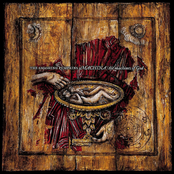Machina/The Machines of God

Biography
Machina/The Machines of God is the fifth album by American alternative rock band The Smashing Pumpkins, released on February 29, 2000 by Virgin Records. A concept album, it marked the return of drummer Jimmy Chamberlin and was intended to be the band's final official LP release prior to their first breakup in 2000. A sequel album—Machina II/The Friends & Enemies of Modern Music—was later released independently via the Internet. As with its predecessor Adore, Machina represented a drastic image a...
Machina/The Machines of God is the fifth album by American alternative rock band The Smashing Pumpkins, released on February 29, 2000 by Virgin Records. A concept album, it marked the return of drummer Jimmy Chamberlin and was intended to be the band's final official LP release prior to their first breakup in 2000. A sequel album—Machina II/The Friends & Enemies of Modern Music—was later released independently via the Internet. As with its predecessor Adore, Machina represented a drastic image and sound change for the band that failed to reconnect the band with chart-topping success. However, after the relatively brief Adore tour, the new lineup featuring Chamberlin and former Hole bassist Melissa Auf der Maur mounted longer international tours that returned the live incarnation of the band to guitar-driven hard rock territory. After the Adore tour ended in the second semester of 1998, Billy Corgan immediately began to work on new material, debuting new songs as early as October of that year.That same month, the four original band members convened, and it was decided that Jimmy Chamberlin would rejoin the band, and that a final album and tour would be mounted before the group disbanded permanently. Corgan envisioned a lengthy concept album in conjunction with a musical theater approach to a tour, based around the idea of the band playing exaggerated versions of themselves, as the press and public seemed to view them. He later explained, "the band had become such cartoon characters at that point in the way we were portrayed in the media, the idea was that we would sort of go out and pretend we were the cartoon characters." A story was conceived revolving around a rock star named Zero (based on the public persona of Corgan) hearing the voice of God, renaming himself Glass, and renaming his band The Machines of God.[citation needed] Fans of the band were referred to as the "Ghost Children", which has now become a term for Pumpkins fans. Corgan started recording demos in late 1998, and the band entered the studio in early 1999. Much like previous albums, the songs were first tracked acoustically at Corgan's house in late 1998 before the band set to work on them at their practice space and the Chicago Recording Company. The recording was conducted with the team responsible for finishing Adore – co-producer Flood and engineers Howard Willing and Bjorn Thorsrud. The band took a break from recording in April 1999 to embark on the Arising! tour, which took the band to nine small clubs. After the tour's conclusion, D'arcy Wretzky left the band, leaving the rest of the band in a difficult position. Corgan later said, "This put a stress obviously on the full integrity of the project, because it was connected to the band not only bringing the music to fruition fully, but also the public component of being in character. I ended up in a broken band with a half-ass enthusiasm towards finishing a project already started." Flood later remembered, "We decided that we were going to have to make a very different kind of record [...] we pretty much went back to the drawing board. Certain songs on the record are survivors from that first period, but it meant a shift in the ways songs had to be formed." Corgan described the new recording process for Machina, now focusing more on the song development than on the concept: “We spent most of the time trying to take the songs as far as they could be taken down a particular avenue. So if it was gonna be proto-cyber metal, we tried to make it very proto and very cyber. If it was acoustic, then we tried to not fall into the typical ballad-y kind of aspects. That's where we spent most of our time. The songs were probably written in about a day.” In the end, the theatrical qualities of the live performances and appearances were mostly abandoned, with the album itself veering away from being a pure concept album. Many of the songs on the album refer to love and relationships (both romantic and otherwise) ending, most of them obvious references to the band themselves. Corgan described "This Time" as "my love song to the band". According to Corgan, the album was structured so that the first eight tracks would be "more poppy", and the last five "more arty". Generally, Corgan appraised the sound of the album as "a rock 'n' roll approach with pop sensibility". After the demure Adore, Machina represented a return to the distorted guitar sound of prior albums, though synthesizers and acoustic guitars were still heavily used. Read more on Last.fm. User-contributed text is available under the Creative Commons By-SA License; additional terms may apply.


